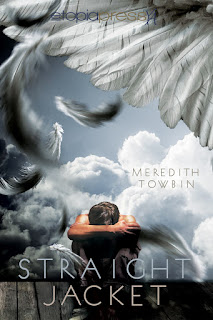I'm so happy to welcome author Catherine Cavendish back to the blog today to discuss her newest novella The Second Wife. I am reading and loving this right now and personally highly recommend it! Take it away Cat...
My latest paranormal
novella – The Second Wife – is a
ghost story. In it, a photograph of Emily Marchant – the deceased first wife of
my main character’s husband, features prominently. There is just something
about that photograph. Something haunted and deadly, as Chrissie is about to
discover.
Recently, I came across
some famous photographs that, so far, have failed to be exposed as fakes. See
what you think:
 Here is a photograph of Freddy Jackson. The
late Freddy Jackson to be precise. You can see him, standing behind one of his
comrades in this group photograph taken in 1919. Freddy was a mechanic, serving
in the Royal Air Force aboard HMS Daedalus. Sadly, he was killed when an
aircraft propeller hit him. Yet here he is, two days later, smiling and recognized
by his comrades in this photograph. How did he get there?
Here is a photograph of Freddy Jackson. The
late Freddy Jackson to be precise. You can see him, standing behind one of his
comrades in this group photograph taken in 1919. Freddy was a mechanic, serving
in the Royal Air Force aboard HMS Daedalus. Sadly, he was killed when an
aircraft propeller hit him. Yet here he is, two days later, smiling and recognized
by his comrades in this photograph. How did he get there?
This photograph was taken
in Bachelor’s Grove
Cemetery Illinois
 Finally, here’s a
curiosity. The chair in this photograph belonged to Lord Combermere, who died
in 1891. While the staff attended his funeral, a photographer set up his camera
in the library and left the shutter open for an hour. When the photographer
developed the plate, the image of a man’s head and arm appeared and he seemed
to be sitting in the chair. Members of the household said the figure closely
resembled the deceased lord. And the chair just happened to be his favourite.
Finally, here’s a
curiosity. The chair in this photograph belonged to Lord Combermere, who died
in 1891. While the staff attended his funeral, a photographer set up his camera
in the library and left the shutter open for an hour. When the photographer
developed the plate, the image of a man’s head and arm appeared and he seemed
to be sitting in the chair. Members of the household said the figure closely
resembled the deceased lord. And the chair just happened to be his favourite.
Now I’ve got you in the
mood for ghostly tales, here’s the blurb for The Second Wife:
Emily Marchant died on Valentine’s Day. If only she’d stayed dead...
When
Chrissie Marchant first sets eyes on Barton Grove, she feels as if the house
doesn’t want her. But it’s her new husband’s home, so now it’s her home as
well. Sumptuous and exquisitely appointed, the house is filled with treasures
that had belonged to Joe’s first wife, the perfect Emily, whom the villagers
still consider the real mistress of Barton Grove.
A stunning photograph of the first Mrs. Marchant hangs in the living room, an unblemished rose in her hand. There’s something unnerving and impossibly alive about that portrait, but it’s not the only piece of Emily still in the house. And as Chrissie’s marriage unravels around her, she learns that Emily never intended for Joe to take a second wife…
A stunning photograph of the first Mrs. Marchant hangs in the living room, an unblemished rose in her hand. There’s something unnerving and impossibly alive about that portrait, but it’s not the only piece of Emily still in the house. And as Chrissie’s marriage unravels around her, she learns that Emily never intended for Joe to take a second wife…
Thank you so much for joining us today, Cat. I absolutely love the photos you've brought to us!
I know our readers will enjoy The Second Wife as much as I do. It's easy - just click on one of the following links to purchase The Second Wife and you can start reading right now!
The Second Wife is available now from:
You can find Cat here:
www.catherinecavendish.comhttp://www.facebook.com/CatherineCavendish
www.goodreads.com as Catherine Cavendish




















